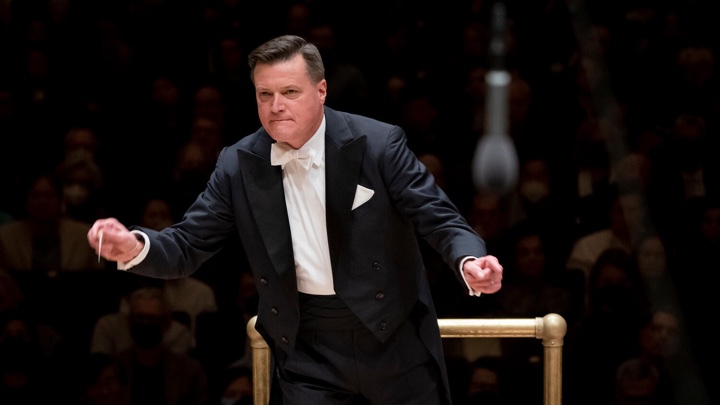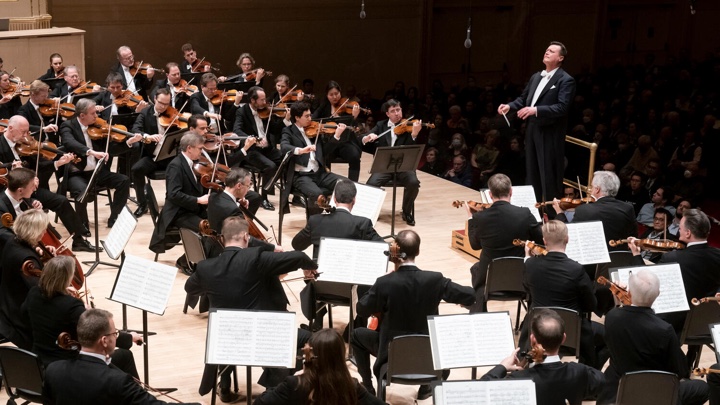

The capacity crowds included current Metropolitan Opera singers and conductors like Piotr Beczala, Günther Groissböck, Daniele Rustioni and Michael Volle, alongside a who’s who of New York’s classical music cognoscenti. Surely some of the spectators came strictly to see and be seen, but anyone with a working pair of ears could tell this was a special occasion. The ability to hear the fine-grained details of this orchestra through multiple successive performances, in music with which they are strongly identified, registers as a distinct highlight of the season.
Perhaps no performance made a stronger impression than the valedictory program on Sunday afternoon, given entirely to Anton Bruckner’s Symphony No. 8 in C Minor. The Viennese players recorded the work in 2021 with Christian Thielemann, their leader for the weekend, but their association with this mammoth and occasionally confounding work dates back to its debut in 1892. Thielemann brought a steady guiding hand to the piece’s immense structure that would dispel any notion that it is ponderous, unfocused or simply sloppy.
In the Allegro moderato, Thielemann precisely introduced the symphony’s subjects, while also turning up the dial on the enormous brass chorales. Subtle details were not lost, though, especially in the woodwinds, and the second-movement Scherzo emerged with a refreshing sense of fun. (Who said Bruckner always had to be gloomy?) The Adagio was ruminative without dragging, setting up the audience for the crashing finale to come.
The closing movement—the last finale Bruckner would complete in his lifetime, leaving the Ninth Symphony unfinished at his death—is marked “Fierelich, nicht schnell.” Solemnly, not quickly. At times, it felt like Thielemann was ignoring with advice, his rubato compacting the tempo into something fleet and thrilling. It all made sense once the themes from the first movement recapitulated near the end of the symphony, crashing into each other like drops of rain against a windowpane. Distinct and different, they confirmed the course we had been on since the symphony’s opening bars.
My companion for the afternoon, a confirmed Bruckner skeptic, regarded it as a Road to Damascus moment. And I could blame the audience member who shouted “Bravo!” while Thielemann was still holding the silence on the podium.
There were other revelatory moments throughout these concerts. Schoenberg’s Verklärte Nacht pulsed with forward momentum and erotic tension without losing its shimmering suspension, and in the piece’s strictly observed key changes, you could hear the composer’s forthcoming innovations. Thielemann paired this tone poem with Richard Strauss’s Eine Alpensinfonie, which burst forth with humor while avoiding kitsch.
With its Mozartian Classicism and serene colorings, Brahms’s Symphony No. 2 in D Major feels like a regressive departure from the composer’s forceful First Symphony, one that I’ve never found all that interesting. Despite some surprisingly sloppy execution after the precision displayed elsewhere—the woodwinds sounding somewhat thick in the Allegro non troppo, abruptly tapered phrasing in the Allegretto grazioso—Thielemann made the case for the work as greater than the sum of its parts, particularly in the rough-riding Allegro con spirito finale.
Only Mendelssohn found the conductor and orchestra noticeably outside their comfort zone. Loose rhythms were apparent in the Hebrides overture, though Thielemann maintained the right sense of mood. Though beautifully played, the Scottish symphony lacked the requisite drama, and aspects of Mendelssohn’s orchestration that mimic the country’s musical traditions were in short supply. I waited, in vain, for the evocation of bagpipes.
Yet taken ton for ton, this was a special experience, one that often affirmed by belief that we return to live performance to discover the new within the familiar. Thielemann, a youthful 63, and the VPO, an even more sprightly 180, still have a lot to say.
Photos: © Jennifer Taylor


























Comments